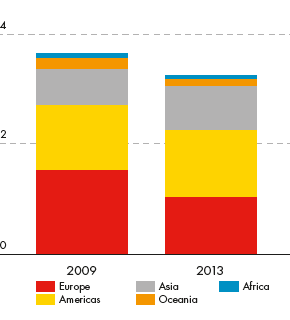Refining capacity million b/d Shell share

We have interests in more than 30 refining sites worldwide. Together they have the capacity to process approximately 3.3 million barrels of oil per day into a wide range of products including gasoline, diesel, heating oil, aviation fuel, marine fuel, lubricants, liquefied petroleum gas, sulphur and bitumen. About 37% of our refining capacity is in the Americas, 32% in Europe, 25% in Asia and the remainder in Africa and Oceania.
We focus on efficiency improvements at our refineries and petrochemicals plants, which have contributed to a reduction in greenhouse gas emissions. Achieving even greater efficiency and operational reliability will help us improve profitability. The average availability of our refineries, a measure of their operational excellence, was 92% in 2013.
A key part of our strategy is to divest non-core assets while selectively investing in high-growth markets, especially in Asia. We have retained the larger and more integrated refineries, and the current portfolio is positioned for optimisation across the entire value chain. However, as a result of the current business environment, we have commenced a review of our global refining portfolio which could potentially lead to asset sales, closures and/or impairments.
We aim to create a Downstream portfolio that is more focused on larger, integrated refining and petrochemical sites that are better able to respond to tighter fuel specifications and growth opportunities. The Port Arthur refinery in Texas has a prominent place. In 2012, we completed a significant expansion to our Port Arthur refinery in Texas, part of the Motiva Enterprises joint venture (Shell interest 50%), which more than doubled the capacity to a total of 600 thousand b/d. The expanded capacity is capable of handling most types of crude and has helped improve our North American advantaged crude processing capability in 2013. New technology also lowers most types of emissions from the refinery on a per-barrel basis.



